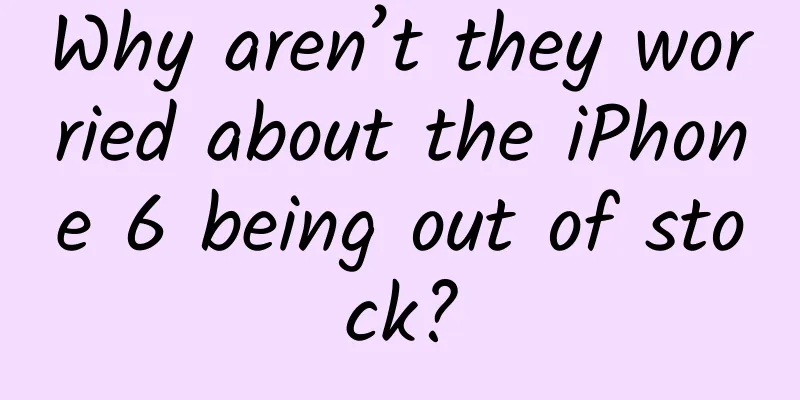Why aren’t they worried about the iPhone 6 being out of stock?

|
"Contract phones are in short supply in all provinces, and bare phones are even harder to buy. We will definitely have to wait a little longer." A staff member in charge of terminal sales at China Telecom told NetEase Technology. After being launched in mainland China for nearly a month, the iPhone 6/6 Plus is still out of stock. "It's out of stock, and I can't buy one myself. The 16GB one is better, but I have to wait a while for the 64GB one," said another China Unicom terminal sales staff. The shortage of supply also exists in China Mobile 's channels, but it is slightly better than the other two operators. A website editor who often deals with the mobile phone industry finally got a silver 64GB iPhone 6 bare phone from a Beijing Mobile business hall after asking for help from others and going through twists and turns for more than a week. Is it because the new iPhone is selling well, or is it because the channel stock is insufficient? Why have the operators become so calm in the face of the imbalance between supply and demand? Will it be easier for consumers to buy from second-hand channels at a higher price than from operator channels? Scalpers who are good at speculating on goods have a new favorite. Who is stealing the limelight from the iPhone? Current situation: Which model is out of stock? The sales channels of iPhone in mainland China mainly include three categories: Apple's own channels, operator channels, and social channels. Among them, social channels include chain stores such as D.Phone and Suning, as well as e-commerce channels represented by JD.com. On Apple's official website, if consumers choose iPhone 6, the estimated delivery time for the three versions of 16GB/64GB/128GB is "7-10 working days"; if they choose iPhone 6 Plus, the estimated delivery time for all three versions is "3-4 weeks". "Even if the product is shipped after seven working days, I can only receive it after two weeks. I can't wait any longer, so I have to ask my friend who works at the operator for help." Xiaoying, an Apple fan, said that with the help of her friends, she finally bought a 64GB version of iPhone 6 from the Beijing Mobile Business Hall last week. Not many Apple fans are as lucky as Xiaoying. According to several staff members of China Unicom Huasheng (a terminal company under China Unicom) and Tianyi Terminal (a terminal company under China Telecom), since the iPhone 6/6 Plus went on sale in China on October 17, many friends have asked them to buy the bare phone from internal channels, but most people are still "waiting in line." "The 16GB version is easier to buy, but the 64GB version is really out of stock and you need to wait." A staff member in charge of terminal sales at China Unicom said, "The first batch of stock was not very sufficient to begin with, and consumers' demand for this generation of iPhone products is mostly concentrated on the 64GB version, so it seems to be even more out of stock." Another person, Mr. Zhang, who works at a mobile phone chain store, expressed the same view: "It's not that more consumers are buying iPhones than in the past few years, but that most Apple fans want to have more experience improvements when they upgrade after using the past few generations of products. The 16GB storage capacity obviously can no longer meet their needs." Various e-commerce channels also reflect the changes in consumers' demand for mobile phone capacity. Not only that, the public version of the iPhone with full network support is even more scarce. On JD.com, searching for "iPhone6 16GB" shows that the "Mobile 4G version" is in stock; searching for "iPhone6 64GB" shows that except for a small number of Mobile 4G versions, all others are "out of stock". Similarly, searching for "iPhone6" on Suning.com shows that most of the available products are the 16GB Mobile 4G version, and there are also a few full-network public versions, but the 64GB and 128GB versions are not in stock, and most of the available products are the Mobile version. Currently, various channels have not announced the first batch of iPhone 6/6 Plus inventory and sales data, but according to people familiar with the three operators, the operators have more supply than the public channels, but the first batch of inventory is not large, "on the first day of launch, one operator in one province will only have 200-300 units." Why are operators so calm in the face of shortages? "The shortage is mainly because Apple is still using the hunger marketing game, which is the case with each generation of products at the beginning of the market." An analyst close to the operator said, "But this is not the whole reason. The enthusiasm of operators for selling Apple phones is also declining. They don't want to spend too much money on stocking up and supporting high subsidies." This is completely different from the sales status of past generations of products. In the past few years, operators have been more willing to use the hot sales of iPhone to drive the growth of mid- to high-end users and increase ARPU (average monthly revenue per user). At the same time, stimulated by high call subsidies, people are also more willing to buy iPhone contract phones from operator channels. One obvious change now is the reduction in subsidies for iPhones from carriers - according to the contract plans announced by China Unicom and China Telecom, the subsidies these two carriers provide for iPhone 6/6 Plus are lower than those for previous generations of iPhones. For example, China Unicom's two-year and three-year "zero-yuan purchase" monthly fee thresholds for iPhone 5 are 386 yuan and 286 yuan respectively, while the two-year and three-year "zero-yuan purchase" monthly fee thresholds for iPhone 6 are 596 yuan and 396 yuan respectively. At the same time, China Mobile, which has already attracted tens of millions of iPhone users online, took a cool approach: it decisively canceled the exclusive packages for the new generation of iPhone phones, and only offered them existing 4G basic packages and free phone bill contracts when purchasing the phone. "The iPhone is still an important product, but its importance is certainly not as high as in previous years." A staff member in charge of marketing at China Unicom admitted that compared with the first two years when the iPhone was introduced, China Unicom's marketing investment in the iPhone is declining. According to Zhang Yi, CEO of iiMedia Research, the change in operators' attitude towards iPhone sales is not surprising. China Unicom and China Telecom, which started selling iPhones in late October 2009 and the first quarter of 2012 respectively, have benefited from the sales of iPhone contracts in the past few years. The iPhone has played an important role in the growth of 3G high-end users and data traffic of these two operators. However, at the same time, China Unicom and China Telecom have also incurred huge marketing expenses, and the cost pressure remains high. Under the policy of reducing costs and terminal subsidies, operators must make changes in the terminal operation link. More importantly, in the past one or two years, there are already many flagship phones that can bring a large number of mid-to-high-end users and data traffic growth to operators. Therefore, operators who have been "working" for Apple for many years and were once caught in a marketing war are beginning to consider untying themselves from the apple tree. "The reduction in operator subsidies has a relatively small impact on iPhone 6/6 Plus shipments," said Peter Lin, senior analyst for wireless smartphone strategies at Strategy Analytics, in an interview with NetEase Technology. This, to some extent, proves the correctness of the operators' change in marketing strategy: on the one hand, operators no longer have to invest huge costs to sell iPhones, because Apple fans' motivation to buy the new generation of iPhones is unlikely to be constrained by changes in operators' subsidies; on the other hand, operators do not have to rush to restock, because the supply will eventually catch up, and consumers with demand will inevitably buy them and will inevitably choose different operators' networks according to their own needs. What operators need to do is to concentrate on building their own 4G high-quality networks. Social Channel: iPhone 6 has been stealing the show According to market research by Strategy Analytics, new iPhones are more likely to be out of stock in public channels than in operator channels. In fact, the price fluctuations of mobile phones in the second-hand market also reflect the changes in supply and demand to a certain extent. NetEase Technology obtained a price fluctuation chart of iPhone 6/6 Plus from a channel dealer who sells second-hand new phones and earns the difference between wholesale and retail. This chart reflects the sales situation of mobile phones on November 8th and shows that the 16GB mobile version of white iPhone 6 is relatively easy to buy, with the price on that day being 5,250 yuan, lower than the official price of 5,288 yuan; the price of the full network version is slightly higher, and the real-time price of the 16GB full network version of black iPhone 6 is 5,350 yuan. On that day, the prices of the gold and silver 64GB all-network versions of the iPhone 6 were 6,200 yuan and 6,500 yuan respectively, both higher than the official price of 6,088 yuan. In addition, the prices of the iPhone 6 Plus 16GB, 64GB and 128GB versions, depending on the color, were 6,050-6,200 yuan, 7,200-7,320 yuan and 8,850-8,950 yuan respectively. The latter two versions were priced higher than the official prices. According to the person in charge of this channel dealer, although the supply of iPhone 6/6 Plus is insufficient and there is room to make a profit from the price difference, it is not the most popular mobile phone at the moment. "The most popular one right now is the high-end version of Mate 7, which can be sold for 4,600 yuan," said the person in charge. It is understood that Mate 7 is Huawei's new generation flagship phone, which was first launched in Germany in early September and started to be sold in China in the middle of the month. The official prices of its standard version and high-end version are 2,999 yuan and 3,699 yuan respectively. Obviously, in the second-hand channel where price fluctuations are most sensitive, the high-end version of Mate 7 has already stolen the limelight from iPhone 6/6 Plus. In the past, the 3,000 yuan price point has always been considered the price red line for domestic mobile phones that lack brand premium capabilities. Zhang Yi believes that among the many domestic brands of mobile phones, products that can "create a trend" are still rare. However, there are more and more domestic mobile phones that consumers can "show off". After several generations of products, Chinese consumers' love for iPhone has gone from crazy to relatively calm. Those consumers who have some favorable impressions on Apple phones but do not have to buy them have more affordable choices in the past two years. In addition to Mate7, ZTE's nubia series, Coolpad's Daguan series, and vivo X series phones have all gained a certain reputation. As a winner of Toutiao's Qingyun Plan and Baijiahao's Bai+ Plan, the 2019 Baidu Digital Author of the Year, the Baijiahao's Most Popular Author in the Technology Field, the 2019 Sogou Technology and Culture Author, and the 2021 Baijiahao Quarterly Influential Creator, he has won many awards, including the 2013 Sohu Best Industry Media Person, the 2015 China New Media Entrepreneurship Competition Beijing Third Place, the 2015 Guangmang Experience Award, the 2015 China New Media Entrepreneurship Competition Finals Third Place, and the 2018 Baidu Dynamic Annual Powerful Celebrity. |
<<: Chen Tong's 1 billion US dollars was unsealed: the first investment was actually in Youku Tudou
>>: Why are operators always blamed when there are problems with WeChat?
Recommend
[Smart Farmers] Don’t panic when typhoons hit your vegetable fields! See how to reduce and remedy the situation
[Smart Farmers] Don’t panic when typhoons hit you...
Analysis of the elements and channels of online promotion plans!
Today we are going to talk about "How to cho...
How to promote App channels effectively? 3 stages!
APP channel promotion needs to go through three s...
Foreign media: iPhone 12 may encounter 5G network connection problems in the UK
According to foreign media reports, Apple's u...
iPhone X first disassembled in China, dual batteries/mainboard reduced by half
For a long time, the disassembly of new iPhones h...
Why is the "hairy monster" roaming the Eurasian continent "frozen" underground?
The mammoth-woolly rhinoceros group, which adapte...
360 LeTV uses Coolpad to balance Xiaomi?
"We will not hinder the cooperation between ...
A brief taste of "Star Ocean 5: Fidelity and Betrayal" in Hong Kong on PS4: A story of loyalty and betrayal in JRPG
I believe that players who like JRPG must be very...
What are some side jobs suitable for office workers? What other side jobs can you do while working?
With the continuous development of technology, pe...
Survival after the explosion of Apollo 13
On April 11, 1970, astronauts Haise, Lovell, and ...
Do you know the 8 ways to place Tik Tok ads?
Here are 8 ways for brands to use Douyin. Brands ...
Ningbo Mini Program Production Company, how much does it cost to produce a home textile mini program?
How much is the quotation for home textile produc...
On the overall perspective of operations: strong initiative and self-reflection
The so-called overall view of operations is nothi...









